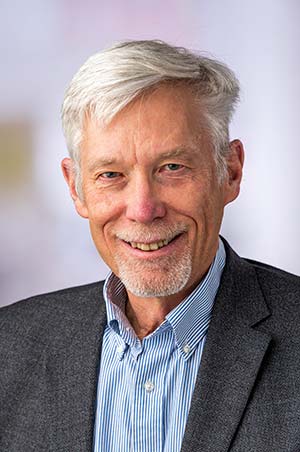David G. Maloney, MD, PhD
Professor Emeritus
Translational Science and Therapeutics Division, Fred Hutch
Member
Immunotherapy Integrated Research Center (IIRC), Fred Hutch
Dr. David Maloney develops new treatments for patients with lymphomas, leukemias and myeloma as well as other cancers. He is widely recognized as an expert in treating people with these cancers. The focus of his laboratory and clinical research is immunotherapies, which are treatments that can enhance anti-cancer immune responses. One strategy uses immune cell products known as antibodies. Dr. Maloney was instrumental in the development and testing of rituximab, the first antibody-based cancer drug on the market. This drug has transformed the treatment of certain leukemias and lymphomas. Dr. Maloney also is developing genetically engineered immune cell therapies, which are called CAR T-cell therapies, for various cancers. He is the first medical director for cellular immunotherapy and the Bezos Family Immunotherapy Clinic at Fred Hutch, where these strategies are being used to treat patients.
Other Appointments & Affiliations
Affiliate Investigator, Clinical Research Division, Fred HutchAffiliate Investigator
Clinical Research Division, Fred Hutch
Education
PhD, Cancer Biology, Stanford University, 1991
Medical Oncology Fellowship, Stanford University, 1988-1994
Internal Medicine Fellowship, Brigham and Woman's Hospital, Boston, 1985-1988
MD, Stanford University, 1985
BS, Chemistry, Whitworth College, 1977
Research Interests
At Fred Hutch, Dr. Maloney's primary clinical focus is developing and testing new immunotherapies for the treatment of cancer. He is also an expert on blood-forming (hematopoietic) stem cell transplantation (HCT) in using a matched donor’s (allogeneic) or a patient’s own (autologous) stem cells in treatments for patients with hematologic malignancies. Recognizing that standard pre-transplant regimens are too toxic for many patients, Dr. Maloney and Fred Hutch colleagues are evaluating approaches that use antibodies to deliver radioactivity or cancer-killing drugs directly to tumors. They have also developed a less toxic, “reduced intensity” (nonmyeloablative) regimen that can more safely provide long-term remissions for patients with chronic lymphocytic leukemia (CLL), non-Hodgkin Lymphoma (NHL) and myeloma after allogeneic HCT.
Autologous HCT followed by reduced intensity allogenic HCT (tandem HCT) has proven effective for refractory NHL and myeloma patients. Dr. Maloney and colleagues have learned that nearly all of the anti-tumor activity of allogeneic HCT comes from the specific graft-vs-tumor activities of donor immune T cells, showing that antitumor immunity can be curative. Unfortunately, these T cells can also cause dangerous “graft-vs-host” effects on normal tissues.
His current focus is on using genetically engineered T cells (such as CAR-T) to treat patients with leukemia, lymphoma, myeloma and selected other cancers without causing graft vs. host disease that has been associated with transplantation.
"...there was much skepticism that antibodies would amount to anything. It has ended up now being a mainstay of cancer therapy."
— Dr. David Maloney
